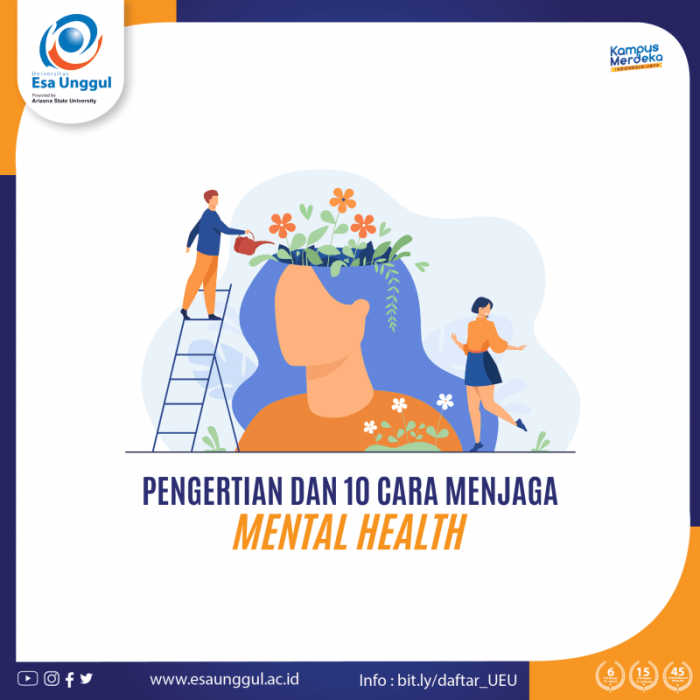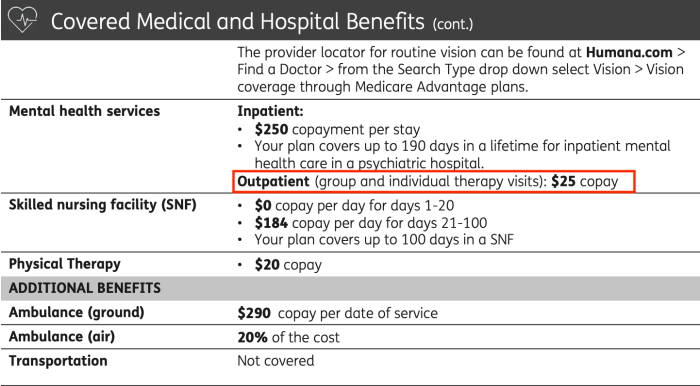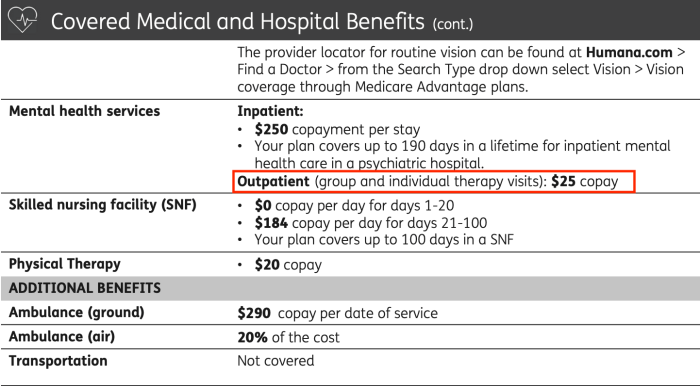Humana Mental Health is a crucial aspect of overall well-being, encompassing a wide range of factors that influence our emotional, psychological, and social health. This guide explores the multifaceted nature of mental health, delving into its impact on individuals, society, and the economy. We will examine the factors that contribute to mental well-being, discuss common mental health disorders, and highlight the importance of seeking help and promoting mental health awareness.
Table of Contents
Understanding the complexities of mental health is essential for creating a more supportive and inclusive environment. This guide provides valuable insights into the various aspects of mental health, empowering individuals to prioritize their own well-being and advocate for better mental health care for all.
The Importance of Mental Health

Mental health is a crucial aspect of overall well-being, encompassing our emotional, psychological, and social health. It influences how we think, feel, and behave. When we are mentally healthy, we are able to cope with life’s challenges, build strong relationships, and contribute meaningfully to our communities. However, when mental health is compromised, it can significantly impact our lives and those around us.
The Impact of Mental Health on Overall Well-being
Mental health plays a vital role in our overall well-being. When our mental health is strong, we are more likely to:
- Have positive relationships with others
- Make sound decisions
- Achieve our goals
- Cope with stress effectively
- Engage in healthy behaviors
Conversely, mental health issues can lead to:
- Social isolation
- Difficulty concentrating
- Increased risk of substance abuse
- Physical health problems
- Reduced productivity
The Societal and Economic Costs of Mental Health Issues
Mental health issues impose a significant burden on society and the economy. According to the World Health Organization (WHO), mental disorders are responsible for a substantial proportion of global disability and disease. The societal costs include:
- Increased healthcare expenditures
- Loss of productivity
- Social stigma and discrimination
- Strain on families and communities
The economic costs of mental health issues are substantial, impacting both individuals and businesses. For instance, a study by the National Alliance on Mental Illness (NAMI) estimated that the annual cost of mental illness in the United States is over $193 billion.
Prevalence of Mental Health Disorders, Humana mental health
Mental health disorders are common, affecting millions of people worldwide. According to the WHO, approximately one in four people will experience a mental health problem at some point in their lives. Some of the most prevalent mental health disorders include:
- Depression
- Anxiety disorders
- Bipolar disorder
- Schizophrenia
- Eating disorders
It is important to note that these statistics only reflect the number of people who have been diagnosed with a mental health disorder. Many individuals struggle with mental health issues without seeking help or receiving a formal diagnosis.
Mental Health Stigma and Discrimination: Humana Mental Health

Mental health stigma is a significant barrier to individuals seeking help and accessing necessary support. It refers to negative attitudes, beliefs, and behaviors towards people with mental health conditions. These attitudes can lead to discrimination, social isolation, and prejudice, ultimately hindering individuals from seeking help and achieving recovery.
Impact of Stigma on Individuals Seeking Help
Stigma can have a profound impact on individuals seeking help for mental health conditions. Fear of judgment, shame, and social isolation can deter individuals from disclosing their struggles and accessing necessary support.
- Delayed Help-Seeking: Stigma can lead to individuals delaying seeking help, worsening their condition and potentially resulting in more severe consequences.
- Non-Disclosure: Individuals may avoid disclosing their mental health conditions to family, friends, or employers, fearing rejection, discrimination, or loss of opportunities.
- Self-Stigma: Individuals may internalize negative societal views and develop self-stigma, leading to feelings of shame, worthlessness, and hopelessness.
- Social Isolation: Stigma can lead to social isolation, as individuals may withdraw from social interactions due to fear of judgment or rejection.
- Discrimination: Individuals with mental health conditions may face discrimination in employment, education, housing, and social settings, further exacerbating their struggles.
Raising Awareness and Combating Stigma
Raising awareness and challenging stigma related to mental health is crucial to create a more supportive and inclusive society. Here are some key strategies for a campaign to combat mental health stigma:
- Education and Awareness Campaigns: Promote understanding and empathy by disseminating accurate information about mental health conditions through public awareness campaigns, educational materials, and social media initiatives.
- Celebrity Endorsements: Engage prominent figures in society to advocate for mental health awareness and challenge stigma. Their influence can reach a wide audience and promote open dialogue.
- Personal Stories: Share personal stories of individuals who have overcome mental health challenges, highlighting their resilience and inspiring others to seek help.
- Media Representation: Advocate for accurate and sensitive portrayal of mental health issues in media, avoiding harmful stereotypes and promoting positive representation.
- Support Groups and Community Initiatives: Encourage the establishment of support groups and community initiatives that provide safe spaces for individuals with mental health conditions to connect, share experiences, and build support networks.
Mental Health in the Education System

Schools play a crucial role in fostering a supportive environment that promotes mental well-being for students. They are not only responsible for academic learning but also for nurturing emotional and social development. This is particularly important during adolescence, a period marked by significant developmental changes and increased vulnerability to mental health challenges.
Early Intervention and Mental Health Support for Students
Early intervention is crucial for addressing mental health concerns among students. Identifying and addressing these issues early on can prevent them from escalating into more severe problems. Schools can play a significant role in this process by providing mental health support services and creating a culture of open communication about mental health. This includes providing access to mental health professionals, implementing mental health awareness programs, and promoting positive coping mechanisms.
Successful Mental Health Programs in Schools
Several successful mental health programs have been implemented in schools across the country. These programs vary in their approach, but they all share the common goal of improving mental health outcomes for students.
Examples of Successful Mental Health Programs in Schools
- School-Based Mental Health Services: These programs provide on-site mental health services, such as counseling, therapy, and crisis intervention, to students. These services can be delivered by school counselors, psychologists, or social workers. For example, the National Alliance on Mental Illness (NAMI) offers a program called “NAMI Ending the Silence” that trains students to become peer educators on mental health issues.
- Mental Health Awareness Campaigns: These campaigns aim to raise awareness about mental health issues and reduce stigma. They often involve educational presentations, workshops, and social media campaigns. For example, the American Foundation for Suicide Prevention (AFSP) has a program called “Out of the Darkness” that hosts walks and other events to raise awareness about suicide prevention.
- Peer Support Programs: These programs train students to provide support to their peers who are struggling with mental health issues. They can offer a listening ear, provide information about resources, and help to reduce feelings of isolation. For example, the Jed Foundation has a program called “Seize the Awkward” that trains students to start conversations about mental health.
By fostering a deeper understanding of mental health, we can break down stigma, promote early intervention, and create a society that values and supports the well-being of all. This guide serves as a starting point for individuals seeking information and resources on mental health. It encourages proactive approaches to mental well-being, highlighting the importance of self-care, seeking professional help when needed, and advocating for positive change in our communities.
Humana recognizes the importance of mental well-being and offers a variety of resources to support their members. For those seeking additional assistance, Humana offers a dedicated phone line, humana 1800 , which connects individuals with qualified mental health professionals. This direct line provides a convenient way to access support and guidance, ensuring that mental health remains a top priority for Humana and their members.


